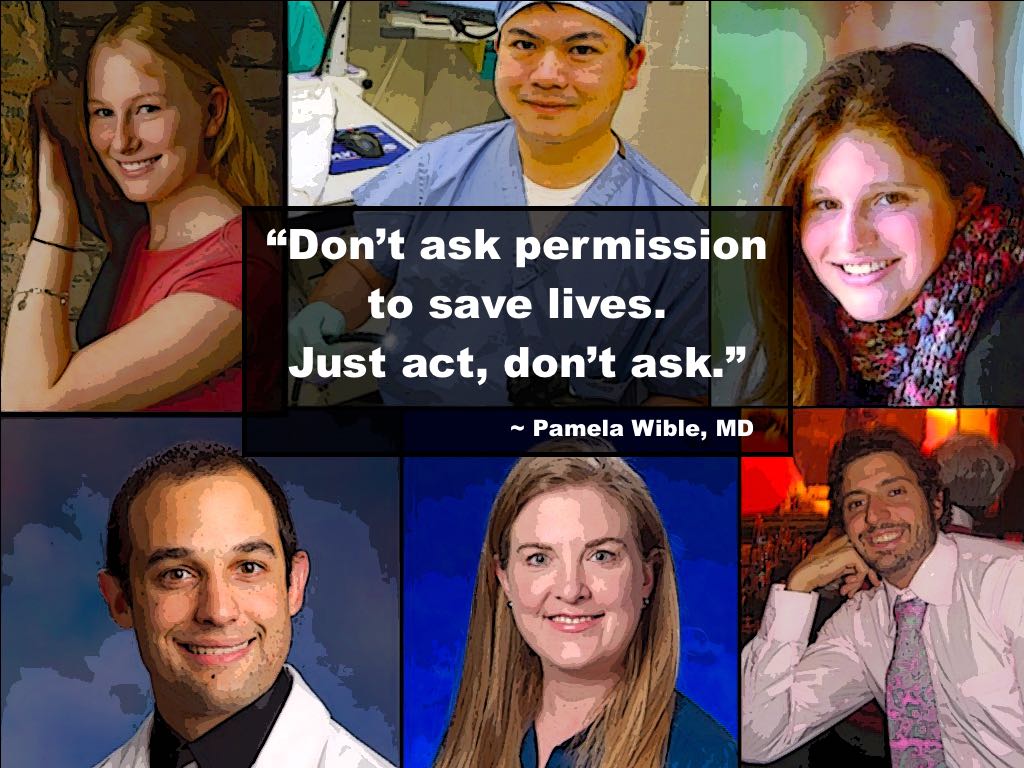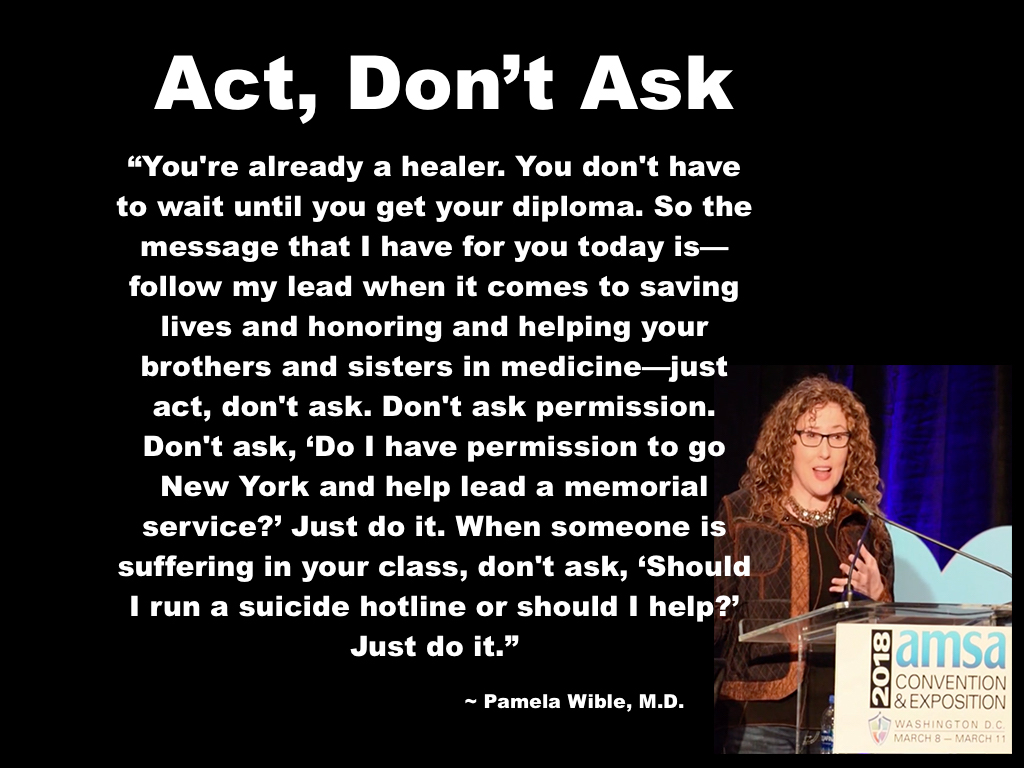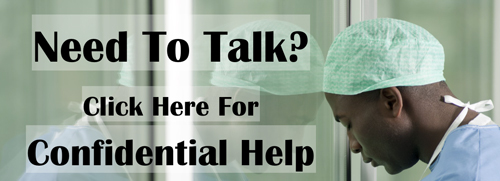Dr. Wible’s AMSA keynote from March 10, 2018, is transcribed and edited below. Click here for FULL keynote address—that received a standing ovation!
Pamela Wible: Alright I’m a little sleep deprived, I was in this room after the film last night until 1:00 in the morning, hanging out with medical students. It was awesome!
I went into medicine (probably like a lot of you) thinking that I was going to just help individual patients one-on-one. I really had no idea that what I was going to end up doing is help heal the entire medical system. I’d like you to open your minds to the idea that you can do so much more than helping that one individual in front of you. You can actually heal entire groups of people at once. You can heal entire healthcare systems—by using your voice and your power to heal.
If you are in this room, you are a healer. Don’t limit yourself to the specialty that you think you’re going for. You might be some other type of healer. When you feel called to be a healer sometimes it’s confusing to know which direction to go. I want you to keep an open mind, because I had no idea I was going to be a physician suicide expert running a suicide hotline for doctors. But your calling comes to you when you’re in a state of receptive silence. So spend some time with yourself every week just listening to what it is that you feel called to do—what the world is calling you for.

I want to share with you the two most important moments of my life and I want you to be on the lookout for when some of these most important moment of your life might happen. Be ready. One of them might happen today. So besides being born, the two moments that changed my life forever were October 28th, 2012 at 3:00 p.m. and January 26th, 2018 at 6:00 p.m.
On October 28th, 2012 I was sitting in the second row at a memorial service for the third physician that we lost to suicide in my small, beautiful town (where there’s a farmers market on every corner and everyone’s smiling and hugging) I live in a beautiful place. Why would there be three physicians suicides in a small town in Oregon within a year and a half? Everyone kept asking why but nobody said suicide out loud at the funeral—which I thought was very odd because how are we going to solve a problem that nobody will say out loud?
Sitting there, I started focusing on why—why is this happening, I was obsessed with the question why and now I can’t let it go—which I think is the sign of a really good scientist interested in solving any kind of problem. You get stuck on why. You can’t sleep. I started counting on my fingers how many physicians I knew that had died by suicide or very suspicious circumstances at a very young age. Within a few minutes I had counted ten. And I’m a young physician, just starting.
I left this memorial early because I was teaching a physician retreat that evening (which is a business course I teach for medical students and physicians who want to launch independent practices).
I’d love to have you join our retreat on scholarship. Apply here.
This retreat had nothing to do with mental health. I opened the retreat with a question, “How many of you have lost a colleague to suicide?” Everyone’s hand was raised. Every single hand in the room. Then I asked, “Well, how many of you have considered suicide yourself?” Every single hand was up, except for one female nurse practitioner.
I’ve spent every waking moment of my life since then completely dedicated to this topic. I started blogging, I started speaking, I could hardly stop speaking about this. My entire house is like a shrine with pictures of dead doctors everywhere. This is like my life’s purpose, I guess.
People started contacting me, families who lost children to suicide in medical school. I started running a hotline, a hotline for physicians who are suicidal and medical students. So they keep calling me, I call them back and we’re on the phone for hours—at no charge. I just started doing this.
Then it accelerated. On January 18th of this year Mount Sinai lost the third physician to suicide in less than two years. Three women stepped off the roofs of buildings at Mount Sinai. And the last one was Deelshad Joomun. Soon after she dies I got three emails; one from an administrator at Mount Sinai, one from a resident who lived in the building where she died—stepping off the 33rd floor, the roof of the building—and another from a wife of a resident. They all demanded that I come to New York and investigate the hospitals, help with all the suicides so I just got on a plane and flew to New York to lead her eulogy and memorial service. I don’t even know this doctor.
At our recent medical student retreat, a student asked, “What was the proudest moment of your life?” The proudest moment of my life is showing up and leading a memorial service for a woman who would otherwise be forgotten, a doctor who stepped off a roof in New York City. That is really the proudest moment of my life—I stepped forward to honor a beautiful physician, colleague of mine, who died in desperation and hopelessness.

So the message that I have for you today is—follow my lead when it comes to saving lives and honoring and helping your brothers and sisters in medicine—just act, don’t ask. Don’t ask permission. Don’t ask, “Do I have permission to go New York and help lead a memorial service?” Just do it. When someone is suffering in your class, don’t ask, “Should I run a suicide hotline or should I help?” Just do it.
You’re already a healer. You don’t have to wait until you get your diploma. You could actually heal people today that are suffering all around you. And there are people in this very room who are suffering right now. Look around. Help them.
The predominant question last night after the film was, “What can we do now as premed and medical students?” I have five things I want to suggest that you consider doing now.
1) Start a warmline. A hotline is more urgent, people are on the edge asking you for help when they got a gun to their head, that’s a little intense. Unlike a hotline, the goal of a warmline is to provide a reassuring voice for people before they reach a point of crisis. So you could run a warmline—put your number out there and let people know, “Hey, if you need someone to talk to, I’m here for you.” I would suggest that you all reach out to at least five or ten people in your class, maybe some people who are isolating themselves and don’t seem to have a lot of friends or are not very extroverted, and just give them your phone number and say, “Hey, do you want to go out to tea, do you want to hang out? I want you to know that I’m here for you and you can call me anytime.” It’s not that hard to do this and you can do this for your entire class, you can do it for four or five people. I’m doing it for the whole world, and it’s actually really fun and healing and I would suggest that you do that.
2) Stop the abuse. The other thing is I want you to stop abuse. As a healer, it is your job to stop human right violations wherever you see it—even inside of medical education. There are human right violations, sleep deprivations, sexual harassment, hazing. If you see any of that—it is your job to stop it as a healer. How do you do this without getting thrown under the bus yourself? I’m gong to give you two examples.
First example: a pediatrician in his 60s told me that in his training there was a professor that would torment the students. He’d pick on people in the room who weren’t doing anything wrong and just torment them. He was an abusive man. So the class met and came up with a plan. Next time he started provoking somebody, the president of the class stood up and said, “We know nobody in the back of the room is being disruptive and we are going to walk out of your class.” And they all stood up, all 160 of them and they walked right out of his class together. And they went straight to the dean’s office and they let the dean know this is what’s happening, that professor was fired and they never saw him again. And that is how you handle bullying as a group. Very effective.
One reason why abuse can continue is because abusers use the traditional divide-and-conquer technique. When you’re isolated, you have less power so that’s why it’s so important for you all to stand up for each other.
Second example: So when they’re pimping—that is when the professor is searching for the weakest person who’s the most sensitive guy, who’s most likely to cry, the woman who may start crying and then everyone else hovers away because they don’t want to be the next one. Pimpers are usually asking very random, weird questions that are not even relevant. So what you do when you’re witnessing pimping? You say, “Hey, I don’t think I know the answer to that question either, do you?” Then everyone goes around and says, “I don’t know the answer to that question.” So that it doesn’t give the professor a chance to pick on one person, as not having the answer. At the end you can all say, “Well maybe we’ll go look it up together.” Podcast: How to stop pimping at your school (and heal yourself)
3) Band together. Don’t allow anyone be separated and abused. Befriend one another, I know of people in medical school who’ve died by suicide and the cause was loneliness. They died of loneliness that led to suicide. You should not let anyone in your class die of loneliness, please. You don’t want anyone in your class, their parents to get a phone call at 3:00 in the morning that their child died of loneliness. That is something that you can prevent now.
4) Start a class petition. What I did in medical school, they had us back in the day killing dogs as part of the physiology curriculum, which I couldn’t believe. Now, I didn’t ask not to do the lab, I basically wrote a letter to the physiology professor and I said, “I will not murder a dog as part of my curriculum. I will not do that.” He wrote me back, “Yes, you will. You’re already on team 11B and if you don’t show up . . .” He tried to strong arm me into it and he also told me, “These are not experiments, they’re experiences from which there is no alternative.” Dehumanizing experiences are not something that should be happening in medical school curriculum so anyway. So I started a petition and collected a bunch of signatures, went to the dean, and basically said, “I’m not going to kill a dog. I’m either going to drop out of medical school or you’re going to let me out of this lab. I’m not going to kill a dog.” And you know what he did? He diagnosed me with Bambi Syndrome, and let me out of it. Act, don’t ask. I did not ask really for the dean’s permission, I told him I will not do this dog lab and he relented.
5) Host a mental health week. It’s really fun, the students at Louisiana State University in Shereveport just had me there (view talk here). They didn’t ask their school, “Could we have a mental health week?” They told them, “We’re gong to have a mental health week and Dr. Wible already agreed to come.” So I would like to invite you all to let your school know that you’re hosting a mental health week. Invite them to participate. And I know Robyn Symon will love for you to screen her film there at your school and I will tell you right now, that I’ll be the keynote speaker and I promise to come to your school and help you lead your mental health week so please contact me here. I’ll come to your school. There’s just no reason not to move forward with this. Thank you.














